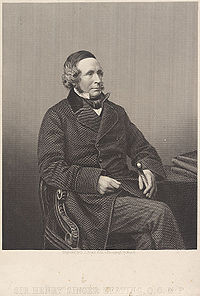Henry Singer Keating
Appearance
(Redirected from Sir Henry Singer Keating)

Sir Henry Singer Keating (13 January 1804 – 1 October 1888)[1] was a British lawyer and politician.
The son of Lieutenant General Sir Henry Sheehy Keating, he attended Trinity College Dublin and became a barrister at the Inner Temple in 1832, and a Queen's Counsel in 1849. He was Member of Parliament for Reading from 1852 until 1860[2] and as Solicitor-General for England from 1857 to 1858 and in 1859.[3] He was knighted in 1857.[4]
He sat as a Judge of Common Pleas from 1859[5][6] to 1875. He became a member of the Privy Council in 1875,[7] entitling him to sit on the Judicial Committee of the Privy Council, the court of last resort for the Empire.[3]
Arms
[edit]
|
References
[edit]- ^ "House of Commons constituencies beginning with "R" (part 1)". Leigh Rayment's House of Commons pages. Archived from the original on 9 June 2017. Retrieved 22 April 2009.
{{cite web}}: CS1 maint: unfit URL (link) - ^ Craig, F. W. S. (1989) [1977]. British parliamentary election results 1832–1885 (2nd ed.). Chichester: Parliamentary Research Services. p. 250. ISBN 0-900178-26-4.
- ^ a b
 Foster, Joseph (1885). . (second ed.). London: Hazell, Watson, and Viney. p. 252.
Foster, Joseph (1885). . (second ed.). London: Hazell, Watson, and Viney. p. 252.
- ^ "No. 22014". The London Gazette. 23 June 1857. p. 2164.
- ^ "No. 22337". The London Gazette. 16 December 1859. p. 4739.
- ^ "No. 22338". The London Gazette. 20 December 1859. p. 4777.
- ^ "No. 24178". The London Gazette. 5 February 1875. p. 452.
- ^ Debrett's Judicial Bench. 1869.
External links
[edit]Categories:
- 1804 births
- 1888 deaths
- Knights Bachelor
- Alumni of Trinity College Dublin
- UK MPs 1852–1857
- UK MPs 1857–1859
- UK MPs 1859–1865
- Liberal Party (UK) MPs for English constituencies
- Solicitors general for England and Wales
- Justices of the Common Pleas
- Members of the Judicial Committee of the Privy Council
- Members of the Parliament of the United Kingdom for Reading
- Burials at Kensal Green Cemetery
- Members of the Privy Council of the United Kingdom
